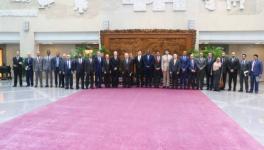Aijaz: The US Aim is to Destroy Iraq and Syria
Newsclick in an interview with political commentator Aijaz Ahmad, discusses Obama's new strategy on IS. Aijaz argues that the decision of the US to train rebels in Syria earlier and now help them, is not for fighting the IS, but for the destruction of nationalist and secular states in the region, replacing them with fragmented and warring, client states. This is the continuation of the neocon Bush policy that Obama has embraced. According to Aijaz, the US policies have directly resulted in enormous violence in the region and given birth to the IS. Its current policy shows no change and promises only more such violence.
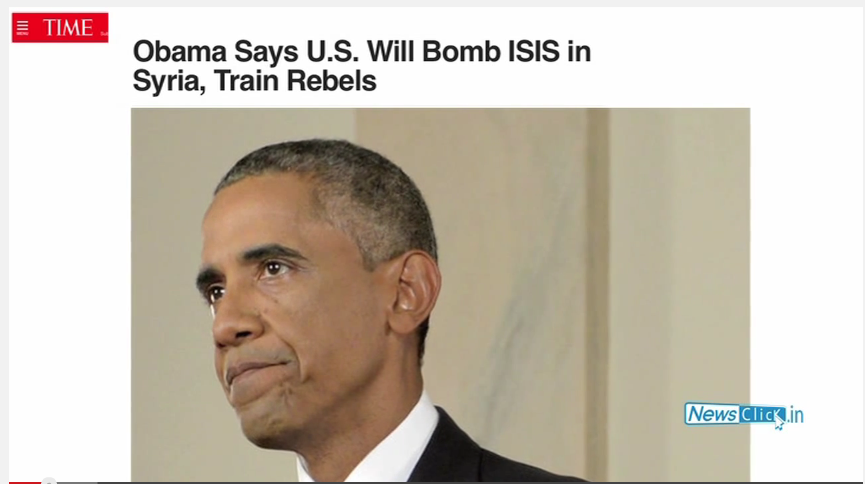
Rough Transcript:
Prabir Purkayastha (PP): Hello and welcome to Newsclick. Today we have with us Prof. Aijaz Ahmad, political commentator and who has been with Newsclick discussing various issues for quite some time. Aijaz good to have you with us.
Aijaz Ahmad (AA): Very good to be back.
PP: Looking at Obama's new statement announcing this strategy of IS do you find any evidence of new strategic thinking on the US part or is it essentially the same old policy of aligning with what would be called the pro Sunni extremist alliance of Turkey, Saudi Arabia, Qatar and Gulf Monarchies on the one side and US against now what is called the IS but also involving bombing of Syria.
AA: Well, I am actually greatly impressed by the consistency of the American strategy and that is why I don't find anything new in this speech.
PP: And you are not being sarcastic.
AA: Not sarcastic. There might be some humor in it but not sarcasm. I mean it exactly that since actually the Clinton period but certainly when Bush came in. The neo-conservative definition of what Americani's strategic interests were in the world but focused very much in the middle east and how to achieve them, how long it will take was bought by the largest section of strategic community in the United States and they have followed that since then and with that there is a sense in United States and that has been going on since Afghanistan. All of these things have a cost. They will have unforeseen consequences. But will have those power to deal with those unforeseen consequences. This whole thing will involve immense amount of violence, killings and all that. But that is what you require if you are going to change the very structure of history. That is a larger strategic design. Central to it has been from the beginning remaking of Iraq and remaking of Syria. What they call roll back of Syria. In 2007, Condolisa Rice said we need a Sunni arch to deal with Shia arch. Which then exactly mean people that have just met in Jeddah. In the recent meeting in Jeddah and the main players are Saudi Arabia, Qatar, Jordan, Turkey and now after seize Egypt supervised by the United States and behind the scenes Israel. This is the coalition and the break up of Syria, destruction of the Assad government is integral to it. So what appears to be a contradiction in American policy is that on the one hand you want to fight IS but the Assad government is the only local government credible which can fight IS. So why don't you align with Assad and so and these are religious and so on. It is only on the surface in my view.
PP: So essentially it means continuation of policies in Syria with the added proviso now that they are going to add aerial bombardment without the sanction of the Syrian government. Will not that be a problem in terms of international law and the fact that Russians have already protested on this.
AA: International law is not a problem for United States and they have said that the kind of warfare you have now in that Geneva conventions don't apply. The very structure of the United Nations and the security conceptions on which it was based do not apply. Even the West failure notion of sovereignty of nations do not apply. Americans have said it again and again. So again it is people who believe in international law quite rightly point out that it is completely in violation of all international law. But Americans don't worry about that but yes it is against international law and the Soviets have been the most vociferous in saying so predictably Iran, predictably Syria itself.
PP: Do you think it is credible in the short run and the medium run that you can fight IS in Iraq and fight against the Syrian regime simultaneously which is supposedly fighting the IS in Syria. Do you think that actually this remaking process is clearly the agenda for the US. It has been so for quite some time. Do you think it is actually going to succeed or is it going to leave essentially the disasters in terms of battles continuing battle contending forces and the destruction on the ground and little else.
AA: Well, that is what happened in Iraq over the last decade. Americans do not seem to be terribly unhappy happened and for that also they have a solution now soft partition, hard partition whatever, Peshmergas are the one's they are really truly backing. This new regime sort of … so called change in the Shia regime they are not too excited about it. They say it is a better situation than it was. So that trifurcation in Iraq, they are perfectly happy about it. Yes, cost would be of that magnitude in Syria. Costs would have been in that magnitude in Afghanistan. Every country that have gone into they have created precisely the situation. But, that's what they believe they need to do and that will take them thirty years to remake the region. So yes, it appears to be incompatible. It is incompatible which is why it will lead to so much violence.
PP: You know there is a map circulating which I think was published in 2006 by the US Lt. Colonel of the army was peak high up in their intelligent set up which shows all these in a map form. Do you think this is what is relying the US policy. If you have seen the thumb.
AA: Yes, I have seen that map it corresponds fairly closely to the sort of thing that US is pursuing there, I think taking up country and turning them into ethnic conclaves which has also broken themselves and therefore, tremendous amount of violent competition among them and not having really a strong powerful states in this whole region is a part of what Americans want. This is the objective.
PP: It is interesting, both Syria and Iraq don't have this history in fact before Iraq invasion by the United States. 40 percent of the Iraqi had inter marriage each other Shias and Sunni. Absolutely this kind of division does not exist. For Syria, this division has not existed hundred and hundreds of years.
AA: Yes, Assad regime had all these people Baathists on both sides whatever else they may have been but they were devoutly secular. The Alavi, the so called Alavi regime and a matter of fact, majority of regime were Sunni in Syria. This is a fiction in itself that Aavi regime.
PP: Hafi Al Ansad has married into the Sunni family.
AA: This is no doubt it works. Alavi are a small commuity and very often what happens in these communities is this military, there were poor peasants community by and large. Yes, absolutely these are the things that have been created. Now, if you create this and if you break the society what do people then have to fall back upon. Finally clamp religious communities, this that and the other and I mean in Iraq we know for a fact that how many of these militias were actually created by the Americans. In Syria, latest seems to be that the so called Free Syrian Army is a complete fiction there are about fourteen to eighteen commanders in the ground who have been supplied and oversee directly by the CIA and now, directly can not be entirely directly it means Saudi and Jordanian intelligence services. Which means you have got a situation that you had with Mujahideen in Iraq. It is a CIA show with the several militias and Turkey.
AA: Now, this is so craze, originally you would think it is said that Qatar is behind the Muslim brotherhood. Now, Qatar has also said to have given at least 2 billion possibly upto 6 billion dollars to all of these militias. They are not Muslim Brotherhood. Originally, in the first..the Muslim Brotherhood were very prominent. But since then, they have been edged out. But Qatar has not withdrawn it's funding. Now, the Muslim Brotherhood is going to leave the Qatar and relocate itself to Turkey. Turkey is said to be entirely behind the Muslim Brotherhood but all these militias have been supported, funded and weaponised by them. So, in the larger picture of this will be that the United States will be finding Arab nationalism it's enemy and the destruction of Arab nation states which came up in the post colonial period that is been the fundamental laymen which is what happening now.
AA: Certainly that but I think you have to go one step further. They don't want any state in this region which would be strong enough even to a post American designs for the management of oil in the area. They just don't want a strong state. Even if it is pro American, even if it is Islamist not Arab nationalist, Pan Islamist whatever. They want to break up these states and have just clients and reduce them to the level of clients and impose upon them what is the relationship with Israel and management of oil.
PP: Thank you Aijaz. Let's continue to see what happens in this region. The way you are describing and the way it is panning out it is clear it's going to continue in this form for quite some time. Thank you very much.
Get the latest reports & analysis with people's perspective on Protests, movements & deep analytical videos, discussions of the current affairs in your Telegram app. Subscribe to NewsClick's Telegram channel & get Real-Time updates on stories, as they get published on our website.









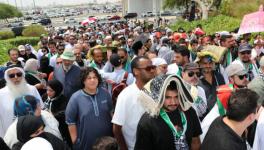
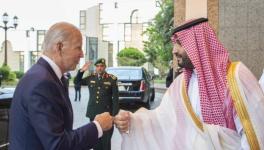
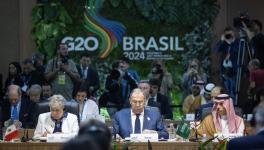
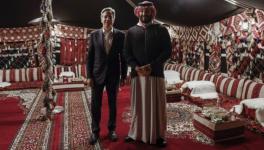
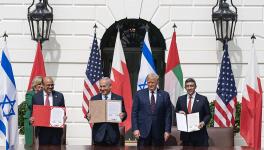
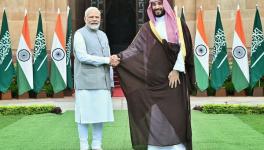
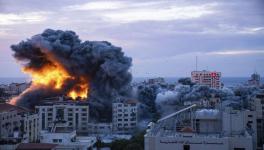
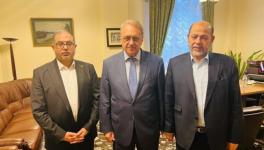
![Raza Kardi, who travelled to Saudi Arabia for the first time in January this year to assist his 70-year-old grandmother in performing Hajj Umrah through an agent from Jhansi, [Uttar Pradesh], was allegedly detained on January 25, 2023, after his photo holding 'Bharat Jodo Yatra' placard in front of Mecca, with laudatory words, went viral back in India.](/sites/default/files/styles/hp_264x150/public/2023-10/bharat%20jodo.jpg.jpeg?itok=7ypwCJZz)
